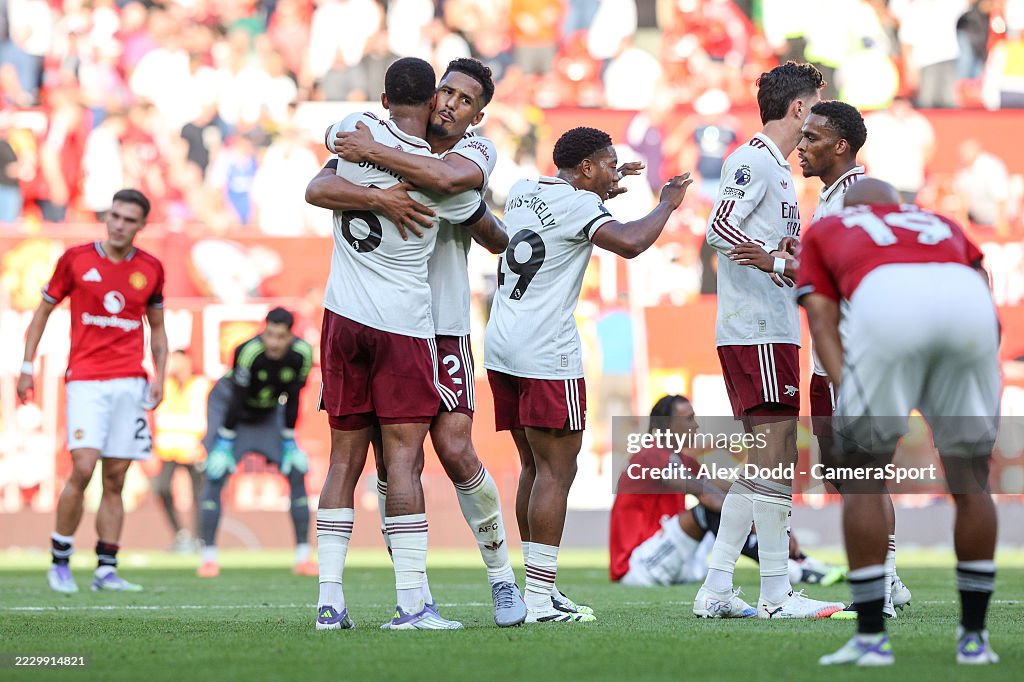Arsenal began the new Premier League season with the type of performance that has come to define them under Mikel Arteta: disciplined, resilient, and ultimately ruthless from a set piece.
Their 1–0 away victory at Old Trafford against Manchester United may not have been a showcase of free-flowing attacking football, but it was exactly the kind of result a team chasing the league title needs in order to establish authority from the very first weekend. After finishing as runners-up in each of the past three seasons, the Gunners have made no secret of their ambition to finally climb the final step to the summit, and this win provided a solid foundation for that goal.
The build-up to the match was dominated by discussions around new signings and absentees. Arteta chose to hand a first start to Viktor Gyökeres, the big-money striker brought in to add firepower to Arsenal’s attack, while Jurriën Timber, who has endured his share of injury problems since arriving in North London, began the game on the bench. On the United side, Matthijs de Ligt started in central defense, adding a touch of Dutch resilience to Rúben Amorim’s back line, while summer arrival Joshua Zirkzee had to wait his turn among the substitutes. The most striking decision, however, was Amorim’s exclusion of André Onana. The Cameroonian goalkeeper, who has been first choice since his arrival from Inter Milan, was not even named in the squad. Amorim later explained that it was simply a selection choice, but the absence sparked immediate debate among fans and pundits alike.
In Onana’s place, Altay Bayindir was entrusted with goalkeeping duties, and just fifteen minutes into the contest he was already at the heart of the decisive moment. Arsenal won a corner, whipped it into the box with their now-famous precision, and Bayindir claimed he had been fouled as bodies jostled around him. The referee waved play on, and Bayindir’s complaint looked more like an excuse than a genuine grievance; he had allowed himself to be muscled out far too easily. The ball dropped perfectly for Riccardo Calafiori, the Italian defender who had pushed forward into the danger area, and he made no mistake from close range. Once again, Arsenal struck from a corner the “special weapon” that has become their calling card under Arteta.
That early goal completely altered the tone of the game. United, stung by conceding so cheaply, were forced to take the initiative. They began to pile forward, relying heavily on their new attacking acquisitions. Bryan Mbeumo, fresh from his transfer, showcased his pace and energy down the right, while Matheus Cunha added a directness that United had lacked in previous seasons. Their most dangerous moment of the first half, however, came from Patrick Dorgu, whose fierce strike beat David Raya but cannoned off the post, denying United the equalizer their pressure seemed to deserve. Arsenal, by contrast, struggled to build sustained attacks of their own. Their midfield was often bypassed, and Gyökeres, though working hard up front, cut an isolated figure.
After the break, the narrative did not change much. United continued their pursuit of the 1–1, while Arsenal dug in deeper, content to absorb pressure and protect their narrow lead. Amorim, sensing his side’s momentum, made another bold move by introducing Benjamin Šeško, one of the most expensive forwards of the summer window. His arrival added fresh energy to United’s attack, but despite his lively movement, clear opportunities remained rare. Moments earlier, Arteta had opted to withdraw Gyökeres, ending the Swede’s much-anticipated debut without a single shot on target a reminder that adjusting to the Premier League can be an unforgiving process, even for prolific strikers.
From the bench, Gyökeres could only watch as United threw everything at Arsenal. Still, the Gunners remained impressively composed. William Saliba and Gabriel Magalhães commanded the defensive line with authority, while Declan Rice worked tirelessly to disrupt United’s rhythm in midfield. When Arteta finally turned to Timber for the last twenty minutes, the Dutchman slotted seamlessly into the defensive structure, helping to close off any remaining gaps and ensuring Arsenal held on to their lead.
The final whistle brought relief for Arsenal and frustration for United. For Arteta’s side, the victory was more than just three points. It was a statement of intent: that they are ready to win the tight, ugly matches away from home that so often determine title races. Their mastery of set pieces continues to be a decisive edge, and with Calafiori’s goal they once again proved that corners and free kicks can be as deadly as flowing attacking moves.
For United, however, the night was another sobering reminder of their shortcomings. Despite being the more proactive team and creating more opportunities overall, they lacked composure in front of goal and failed to make their superiority count. Amorim’s new attacking recruits showed flashes of quality but did not provide the finishing touch that was needed. The exclusion of Onana will also remain a talking point, with Bayindir’s shaky performance adding fuel to the debate about whether Amorim made the right call.
Looking ahead, Arsenal will return to the Emirates next Saturday to face Leeds United, carrying both confidence and momentum into their first home fixture of the campaign. United, meanwhile, must regroup quickly before traveling to Fulham on Sunday, knowing that another slip could see their start to the season unravel. For the Gunners, this was exactly the kind of gritty win that champions-in-waiting deliver; for United, it was a frustrating reminder that dominance counts for little without precision.


